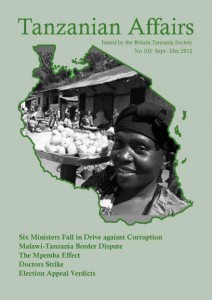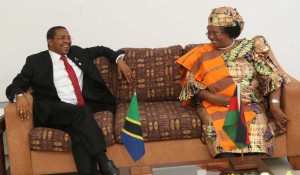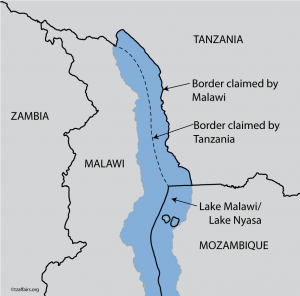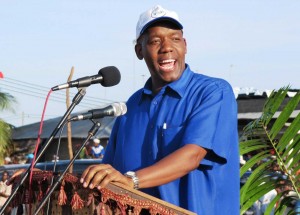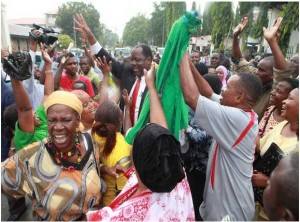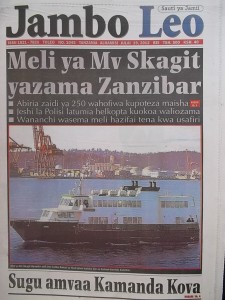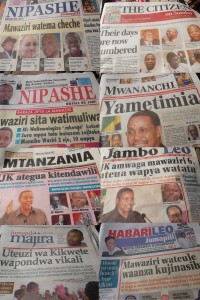
Selection of local newspaper headlines following the sacking of ministers
The last issue of TA (No 102) detailed the growing tension in Tanzania following revelations in the reports of the Controller and Auditor General (CAG) about widespread corruption in institutions all over the country and the perception that the government was not doing much about it. The reports had highlighted cases of corruption, embezzlement of public funds, financial mismanagement and bureaucratic ineptitude.
Rapid action
As soon as President Kikwete returned from Brazil, an urgent meeting of the country’s top policy making body – the 30 member Central Committee of the ruling CCM party – was convened, and quickly authorised the President to take appropriate action.
A debate in Parliament had featured angry MPs from the CCM and the opposition parties, demanding the resignation of the ministers implicated in the irregularities, failing which they should be forced out of office. At the parliamentary sitting and subsequent CCM caucus meeting in Dodoma, the leaders went on to name eight ministers they wanted out immediately. At the same time, another group of MPs led by Chadema’s Zitto Kabwe MP filed a private members’ motion of no confidence in Prime Minister Mizengo Pinda because, as head of government business in Parliament, he had failed to rein in the non-performing ministers (see TA 102).
Matters were not eased as the public and various groups joined the fray, piling pressure on President Kikwete to crack the whip. There were also calls for the Speaker to convene an emergency session within 14 days to discuss Mr Kabwe’s motion.
On May 5 the President reshuffled his cabinet and this went a long way towards appeasing the critics. He dropped six ministers – Mustapha Mkulo (Finance), William Ngeleja (Energy & Minerals), Hadji Mponda (Health and Social Welfare), Dr Cyril Chami (Industry & Trade), Ezekiel Maige (Tourism & Natural Resources) and Omar Nundu (Transport).
He then appointed three new ministers – Dr William Mgimwa (Finance), Prof Sospeter Muhongo (Energy & Minerals) and Dr Abdallah Omar Kigoda (Industry & Trade), who were considered by most people to be very well qualified. Ten new deputy ministers were also appointed. Finance and Energy & Minerals were given two deputy ministers.
Big purge in local government
In June, Prime Minister Mizengo Pinda sacked twelve local government district executive directors, warned eleven and suspended three others pending investigations into allegations that some councils were failing to fulfil their obligations with swindling and misappropriation of public funds. Some of these were taken to court.
30 senior people charged
The President has indicated that some 30 persons in senior positions in government have been charged with corruption in the last few years. Their cases are slowly moving through the legal process. After the cabinet reshuffle, many more corruption cases have been revealed and several prominent people have been charged. In fact, so numerous are the cases now under examination by various authorities, that it would take up the whole of this issue of TA to give the full story. What follows is a very brief summary of the bold steps being taken in Tanzania to put a brake on corruption.
Former President Mkapa testifies in the Mahalu case
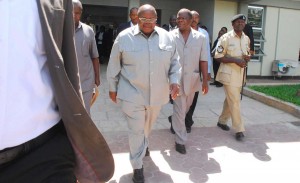
Former President Benjamin Mkapa leaves the court room after testifying – photo Francis Dande
Former President Dr Mkapa made history on May 8 by becoming the first retired Head of State in the country to appear in person before a court and testify. He was a defence witness in the alleged TShs 2.5 billion theft case facing former Tanzanian Ambassador to Italy, Prof Costa Mahalu, which has been going on for over five years. The Ambassador has been accused of forging documents relating to the purchase of an embassy building in Rome, by using two separate contracts in the deal.
In his testimony, Mr Mkapa told the court that he was aware that the building was purchased at more than Euros 3 million and had approved the whole process. Paying the money through two contracts had been requested by the owner of the property. He said: “We had a big problem to agree to these conditions in order to make sure that we got the building.” When asked if there were other buildings where owners required the payment to be through two separate accounts, Mr Mkapa said that he was aware of some but could not divulge the information as doing so might hurt the relations between the two countries.
In his testimony, Mr Mkapa praised Prof. Mahalu: “I have known him as a person with a strong character, who is sincere, honest, obedient and a hard worker,” The court acquitted Mahalu on August 9, although the Office of the Director of Public Prosecutions has expressed an intention to lodge an appeal.
TPDF
For the first time senior officers in the Tanzania People’s Defence Force (TPDF) have been arraigned in a civilian court and charged with abuse of office. A group of seven, including the National Service Executive Director, several Lt. Colonels, two majors and a sergeant were charged. According to the Citizen, the matter revolved around procurement of used motor vehicles and heavy construction equipment, allegedly without following the relevant procurement laws. The accused were released on bail.
TANESCO
The Tanzania Electric Supply Company (Tanesco), which is repeatedly in trouble of one kind or another, now has new problems. The main one concerns its long-standing dispute with Dowans (fully reported over the years in TA) concerning a decision in November 2010 by the International Chamber of Commerce (ICC) to award Dowans Holdings SA (Costa Rica) and Dowans (Tanzania) Ltd $65 million for wrongful termination of a power generation contract in 2008. The ICC made the award in favour of Dowans after it was satisfied that Tanesco unlawfully terminated an emergency generating contract with Dowans.
Tanesco petitioned the court to block this order. But it seems that Tanesco might finally be forced pay the money due to its failure to appeal within the time set by the law. Dowans said: “No action has been taken by Tanesco in lodging the appeal or to follow up the matter, or take any other necessary steps to further the progress of the appeal, and more than 60 days have passed since the decision was pronounced.” If the High Court agrees with Dowans, it would be a double blow for Tanesco which would automatically lose $30 million it deposited at the London- based tribunal as security for costs as it struggled to block another application for execution of the ICC award.
In its defence, Tanesco alleged that public procurement rules were grossly flawed in 2006 when the government directed Tanesco to award the contract to the American Richmond Development Company, which later passed on the contract to Dowans. According to Tanesco, the ICC deliberately disregarded evidence that the procurement of the power agreement was carried out in the absence of a valid tender after Tanesco’s tender board cancelled the initial award.
Tanesco’s second problem is that in the 2009/2010 financial year it is alleged to have spent more than the sum set aside for revamping one of the facilities at the Mtera dam.
The new Minister for Energy, Prof. Muhongo, revealed the startling information that Tanesco employees had been sabotaging the company. Some electricity poles originating in Iringa had been transported to Mombasa before being brought back to Tanzania with documents stating that they originated in South Africa. Boxes of spare parts being imported from UK had contained only nails. The Minister revealed several other similar cases to Parliament.
The Police
The Citizen reported in August that, in a bid to fight corruption within the Police Force, any police officer who was caught asking for and receiving bribes would be named in public before appropriate legal measures were brought against him/her. The new Minister for Home Affairs, Dr Emmanuel Nchimbi, told MPs that his ministry was working hard to eradicate corruption from the Police Force.
MP in court on graft charge
The CCM MP for Bahi, Dodoma Region, who is also a member of the parliamentary Local Authorities Accounts Committee, was arrested in early June and charged with soliciting and receiving a bribe. His arraignment came two days after officials of the PCCB arrested and questioned him over allegations of being bribed TSh1 million by a senior government official. He was arrested at the Peacock Hotel in Dar es Salaam as he was reportedly receiving the amount from the Mkuranga District Executive Director. He was said to have asked for TShs 8 million to induce him to approve the district council’s 2011/12 financial report. The MP denied the charge, and was released on bail.
MP charged with forgery and abuse of office
On May 29 the Citizen reported that the Shirika la Usafiri Dar es Salaam (UDA) Board Chairman, a former cabinet minister, had been charged with eight counts of forgery and abuse of office, allegedly causing the public transport firm a TShs 2.4 billion loss. Two other UDA senior officials were also charged. The three denied the charges and were released on bail.
In one of the counts read by a prosecutor from the PCCB, the accused were said to have obtained for their own benefit TSh320 million intended to be an advance commitment and part payment for UDA shares. It was further alleged that in February 2011 the officials abused their positions by disposing of 7,880,330 unissued shares of UDA, a company owned jointly by the central government and the Dar es Salaam City Council. without conducting competitive tendering and in violation of the relevant regulations.
New minster exercises his power
The Citizen reported that on May 29 the newly appointed Minister for Industry & Trade, Dr Abdallah Kigoda, had suspended the Director of the Tanzania Bureau of Standards (TBS), whose alleged poor performance was said to have contributed to the sacking of his (Kigoda’s) predecessor, Dr Cyril Chami. The Minister ordered investigations to be made into TShs 23 billion in fees that went allegedly to ‘ghost agents’ subcontracted to inspect Tanzanian imports. The scam was said to have led to the importation into Tanzania of thousands of substandard vehicles.
The EPA case
During the long standing External Payments Arrears (EPA) case, a businessman confessed on July 25 that 50 per cent of the money deposited in his company from the EPA had been transferred abroad. He was being charged with other two businessmen and Bank of Tanzania (BoT) employees. The hearing came two days after he was convicted in another EPA case and sentenced to three years in prison.
Ministry of Natural Resources & Tourism
According to the Citizen, among those allegedly involved in doubtful activities in this ministry were the Director of the Forestry and Beekeeping Division and the former Minister himself (Mr Ezekiel Maige), who was reported as failing to prevent illegal exports of live wildlife. The National Parks (Tanapa) Director General was believed to have allowed excessive expenditure on normal maintenance and installation of communication devices and other equipment in the Ministry’s library. Allegations were made in the CAG reports that this division of government had also failed to account for TShs 874 million royalty for forest products.
On August 12 the new Minister, Mr Khamis Kagasheki, sacked three officials and demoted and gave warnings to several others in connection with the smuggling of live animals. 116 animals and 16 birds were allegedly smuggled out of the country in November 2010 using a Qatar cargo plane. The sacked officials included the Director of Wildlife and the Assistant Director of Wildlife Promotion.
Obsolete Aircraft
According to the East African, a major Chinese investment firm had procured two obsolete aircraft for Air Tanzania, one of which crashed in April at Kigoma airport injuring 35 passengers. The Controller and Auditor General recommended that the government officials who participated in the deal to buy the aircraft from a Lebanese company be taken to court.
Swiss bank accounts
In June Zitto Kabwe MP called on the government to determine who owned huge sums of money deposited in Swiss accounts believed to be from the gas industry. Apparently the Swiss National Bank released a story that some TSh303 billion had been stashed away by some Tanzanians in Swiss banks.
